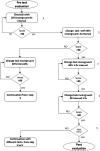Effect of Cognitive Rehabilitation by Auditory Stroop Training on Quality of Life of Individuals with Tinnitus
- PMID: 37974734
- PMCID: PMC10645756
- DOI: 10.1007/s12070-023-04011-w
Effect of Cognitive Rehabilitation by Auditory Stroop Training on Quality of Life of Individuals with Tinnitus
Abstract
Background: Studies have shown that tinnitus patients have difficulties in cognitive function such as memory and attention. The Stroop task engages the attention network where one aspect of the stimulus is noticed while the other one is ignored. Thus, Stroop training can improve the patient's cognitive control and ability to ignore the tinnitus signal. Method: Thirty chronic tinnitus (> 6 months) patients were included in this study. They were distributed into two 15-member groups: intervention and control. Common audiometric, psychometric, and psychoacoustic evaluations of tinnitus were performed for two groups before intervention and after auditory Stroop training of group 1. Results: There was significant difference in the quality of life and THI scores, VAS of annoyance, and reaction time of Stroop task before and after intervention in group1. The decreased reaction time was positively correlated with improved quality of life, THI score, and VAS of annoyance. Conclusion: Cognitive rehabilitation using tasks such as auditory Stroop can be effective in controlling tinnitus by improving cognitive control.
Supplementary information: The online version contains supplementary material available at 10.1007/s12070-023-04011-w.
Keywords: Auditory Stroop; Cognitive rehabilitation; Stroop training; Tinnitus.
© Association of Otolaryngologists of India 2023. Springer Nature or its licensor (e.g. a society or other partner) holds exclusive rights to this article under a publishing agreement with the author(s) or other rightsholder(s); author self-archiving of the accepted manuscript version of this article is solely governed by the terms of such publishing agreement and applicable law.
Conflict of interest statement
Conflict of InterestAll authors certify that they have no affiliations with or involvement in any organization or entity with any financial interest or non-financial interest in the subject matter or materials discussed in this manuscript.
Figures
Similar articles
-
Combined Bifrontal Transcranial Direct Current Stimulation and Auditory Stroop Training in Chronic Tinnitus.Indian J Otolaryngol Head Neck Surg. 2023 Mar;75(1):8-13. doi: 10.1007/s12070-022-03258-z. Epub 2022 Nov 7. Indian J Otolaryngol Head Neck Surg. 2023. PMID: 37007882 Free PMC article.
-
Testing A Hypothesis: Tinnitus Control by Enhancing Physiological Inhibition.Indian J Otolaryngol Head Neck Surg. 2022 Dec;74(Suppl 3):4212-4217. doi: 10.1007/s12070-021-02915-z. Epub 2021 Oct 11. Indian J Otolaryngol Head Neck Surg. 2022. PMID: 36742728 Free PMC article.
-
The effectiveness of the combined transcranial direct current stimulation (tDCS) and tailor-made notched music training (TMNMT) on psychoacoustic, psychometric, and cognitive indices of tinnitus patients.Am J Otolaryngol. 2022 Jan-Feb;43(1):103274. doi: 10.1016/j.amjoto.2021.103274. Epub 2021 Oct 20. Am J Otolaryngol. 2022. PMID: 34715486
-
Cognitive behavioural therapy for tinnitus.Cochrane Database Syst Rev. 2020 Jan 8;1(1):CD012614. doi: 10.1002/14651858.CD012614.pub2. Cochrane Database Syst Rev. 2020. PMID: 31912887 Free PMC article.
-
The Association Between Effectiveness of Tinnitus Intervention and Cognitive Function-A Systematic Review.Front Psychol. 2021 Jan 6;11:553449. doi: 10.3389/fpsyg.2020.553449. eCollection 2020. Front Psychol. 2021. PMID: 33488438 Free PMC article.
References
LinkOut - more resources
Full Text Sources

